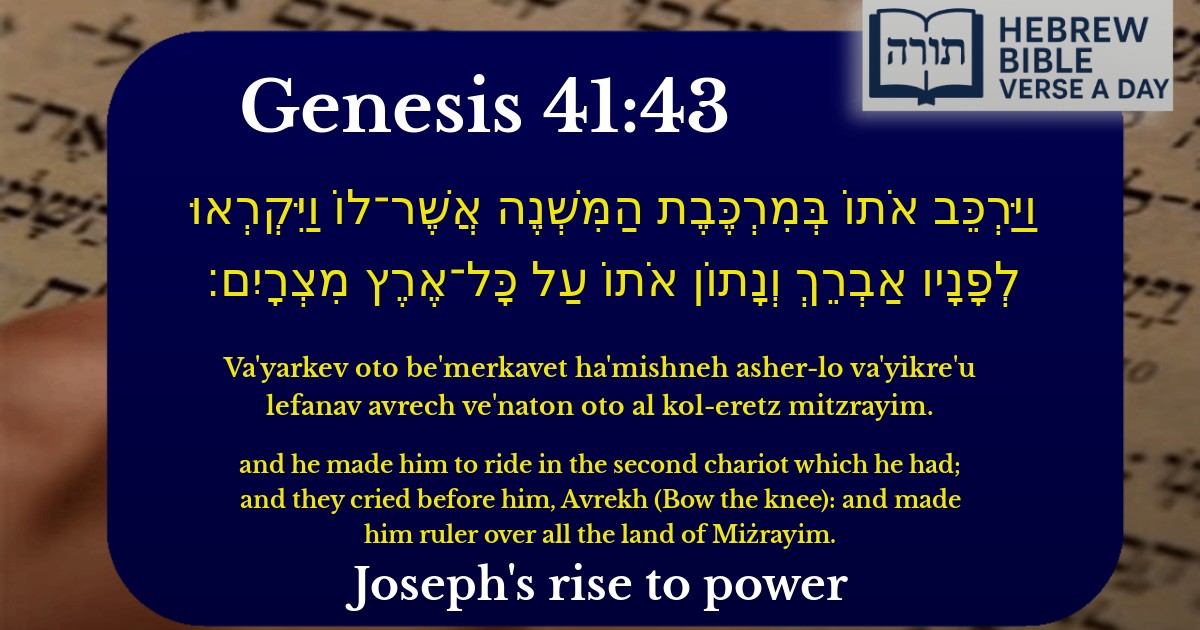Join Our Newsletter To Be Informed When New Videos Are Posted
Join the thousands of fellow Studends who rely on our videos to learn how to read the bible in Hebrew for free!
Hebrew Text
וַיַּרְכֵּב אֹתוֹ בְּמִרְכֶּבֶת הַמִּשְׁנֶה אֲשֶׁר־לוֹ וַיִּקְרְאוּ לְפָנָיו אַבְרֵךְ וְנָתוֹן אֹתוֹ עַל כָּל־אֶרֶץ מִצְרָיִם׃
English Translation
and he made him to ride in the second chariot which he had; and they cried before him, Avrekh (Bow the knee): and made him ruler over all the land of Miżrayim.
Transliteration
Va'yarkev oto be'merkavet ha'mishneh asher-lo va'yikre'u lefanav avrech ve'naton oto al kol-eretz mitzrayim.
Hebrew Leining Text
וַיַּרְכֵּ֣ב אֹת֗וֹ בְּמִרְכֶּ֤בֶת הַמִּשְׁנֶה֙ אֲשֶׁר־ל֔וֹ וַיִּקְרְא֥וּ לְפָנָ֖יו אַבְרֵ֑ךְ וְנָת֣וֹן אֹת֔וֹ עַ֖ל כׇּל־אֶ֥רֶץ מִצְרָֽיִם׃
וַיַּרְכֵּ֣ב אֹת֗וֹ בְּמִרְכֶּ֤בֶת הַמִּשְׁנֶה֙ אֲשֶׁר־ל֔וֹ וַיִּקְרְא֥וּ לְפָנָ֖יו אַבְרֵ֑ךְ וְנָת֣וֹן אֹת֔וֹ עַ֖ל כׇּל־אֶ֥רֶץ מִצְרָֽיִם׃
🎵 Listen to leining
Parasha Commentary
📚 Talmud Citations
This verse is quoted in the Talmud.
📖 Sotah 36b
The verse is discussed in the context of Joseph's elevation to power in Egypt, particularly focusing on the term 'Avrekh' and its interpretation.
📖 Megillah 16b
The verse is referenced in a discussion about the honor and titles given to Joseph, comparing it to other instances of honorific titles in the Bible.


Pharaoh's Elevation of Yosef
The verse describes Pharaoh's appointment of Yosef as viceroy over Egypt, symbolized by the "second chariot" and the proclamation "Avrekh." Rashi explains that the "second chariot" (מִרְכֶּבֶת הַמִּשְׁנֶה) refers to Pharaoh's own royal chariot, second only to his own throne, demonstrating Yosef's supreme authority under Pharaoh. The Midrash (Bereshit Rabbah 90:3) elaborates that this act signified Yosef's elevation to a position of governance, with all of Egypt bowing before him.
The Meaning of "Avrekh"
The term אַבְרֵךְ ("Avrekh") is subject to various interpretations in traditional sources:
Yosef's Authority Over Egypt
The phrase וְנָתוֹן אֹתוֹ עַל כָּל־אֶרֶץ מִצְרָיִם ("and made him ruler over all the land of Egypt") underscores Yosef's complete administrative control. The Talmud (Pesachim 119a) notes that Yosef's rulership was so absolute that even Pharaoh's own household was subject to his decrees. The Sforno adds that this appointment fulfilled Yosef's earlier dreams (Bereshit 37:5-11), demonstrating Divine Providence in elevating him to save Egypt and his family.
Symbolism of the Chariot
The מִרְכֶּבֶת הַמִּשְׁנֶה ("second chariot") also carries deeper meaning. The Kli Yakar explains that the chariot represents mobility and authority, allowing Yosef to enforce his policies throughout Egypt. The term mishneh ("second") may allude to Yosef being second only to Pharaoh, or it may hint at his role as a sustainer (as in mishneh kesef, "double money"), ensuring Egypt's survival during famine.